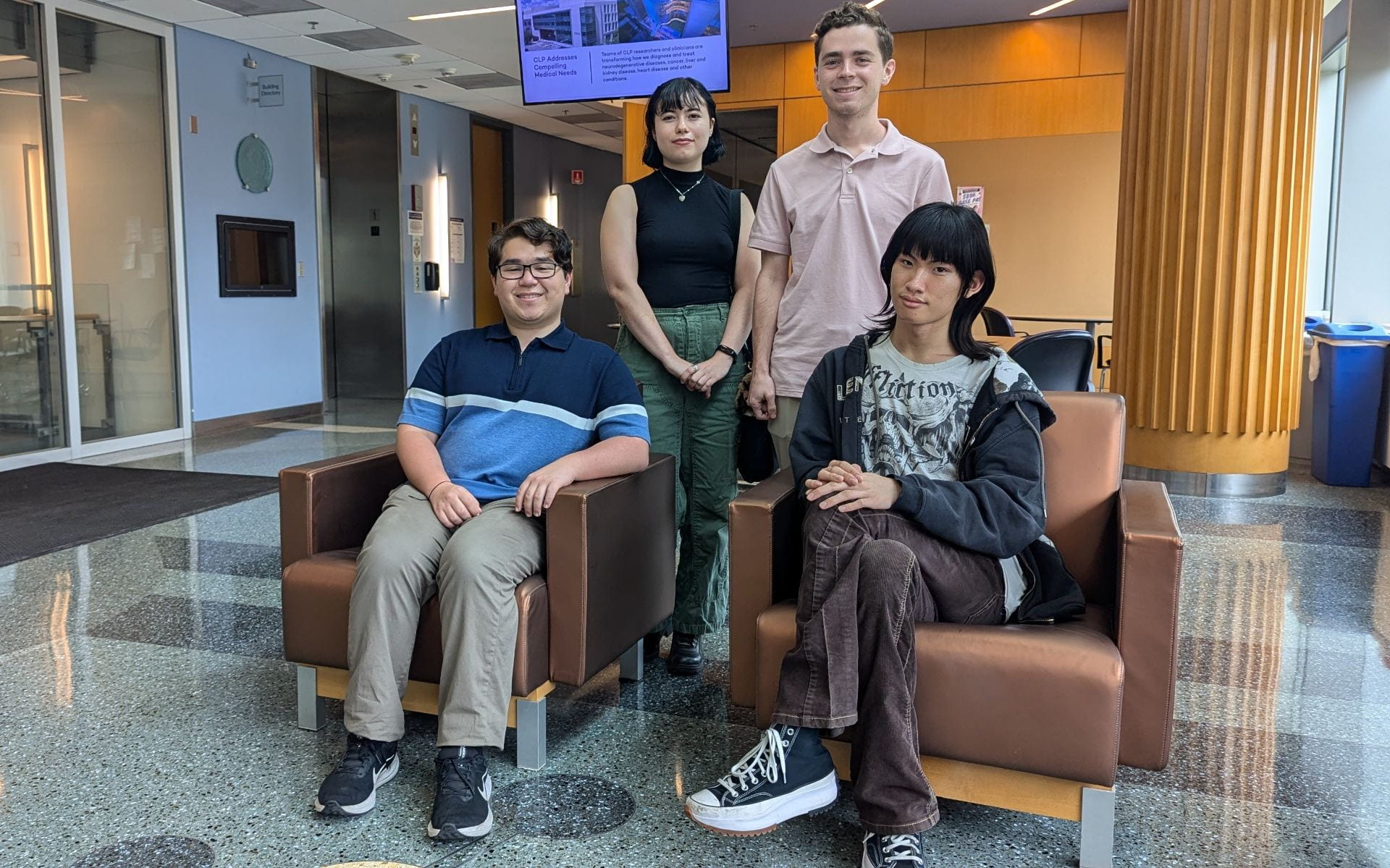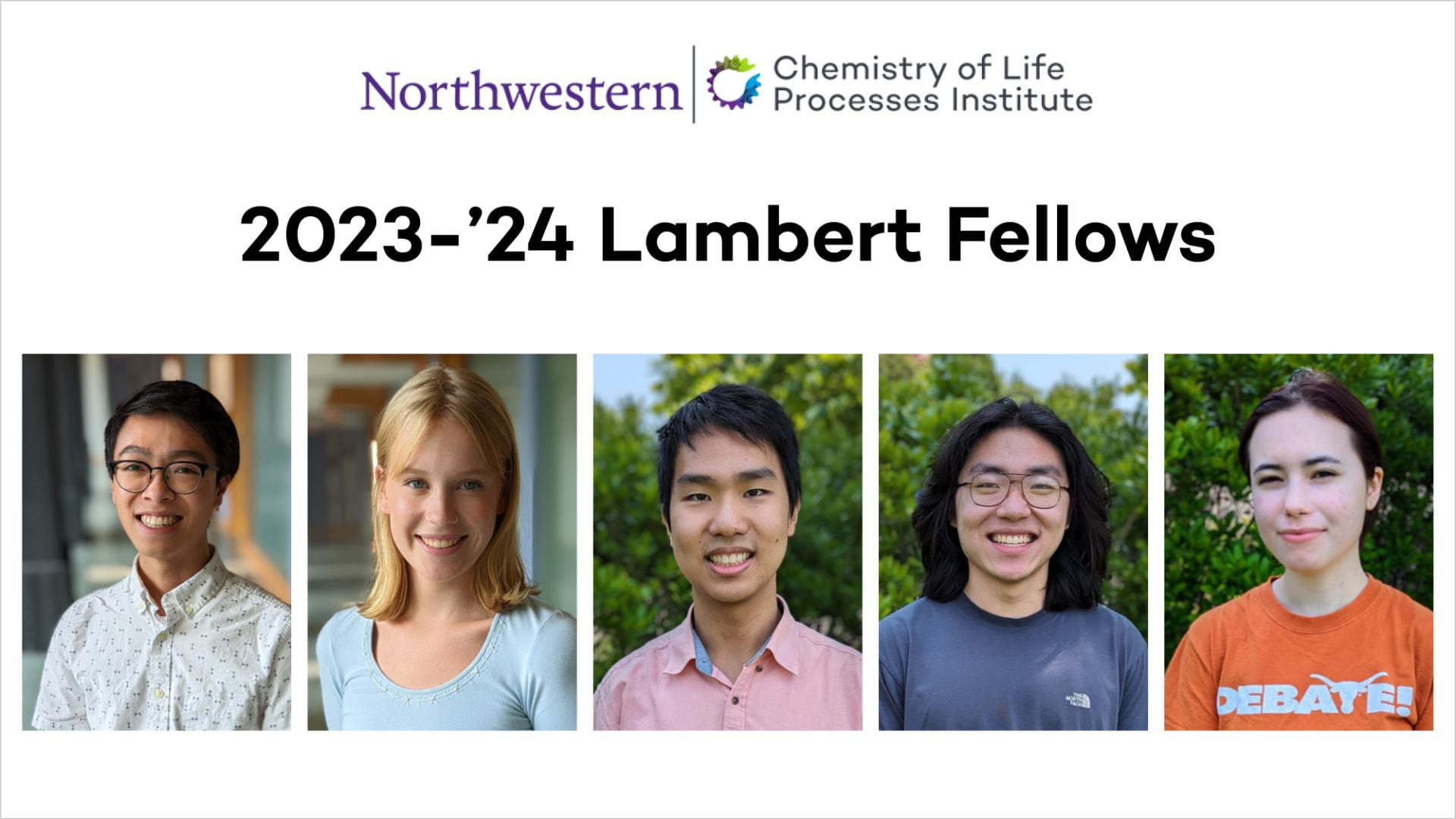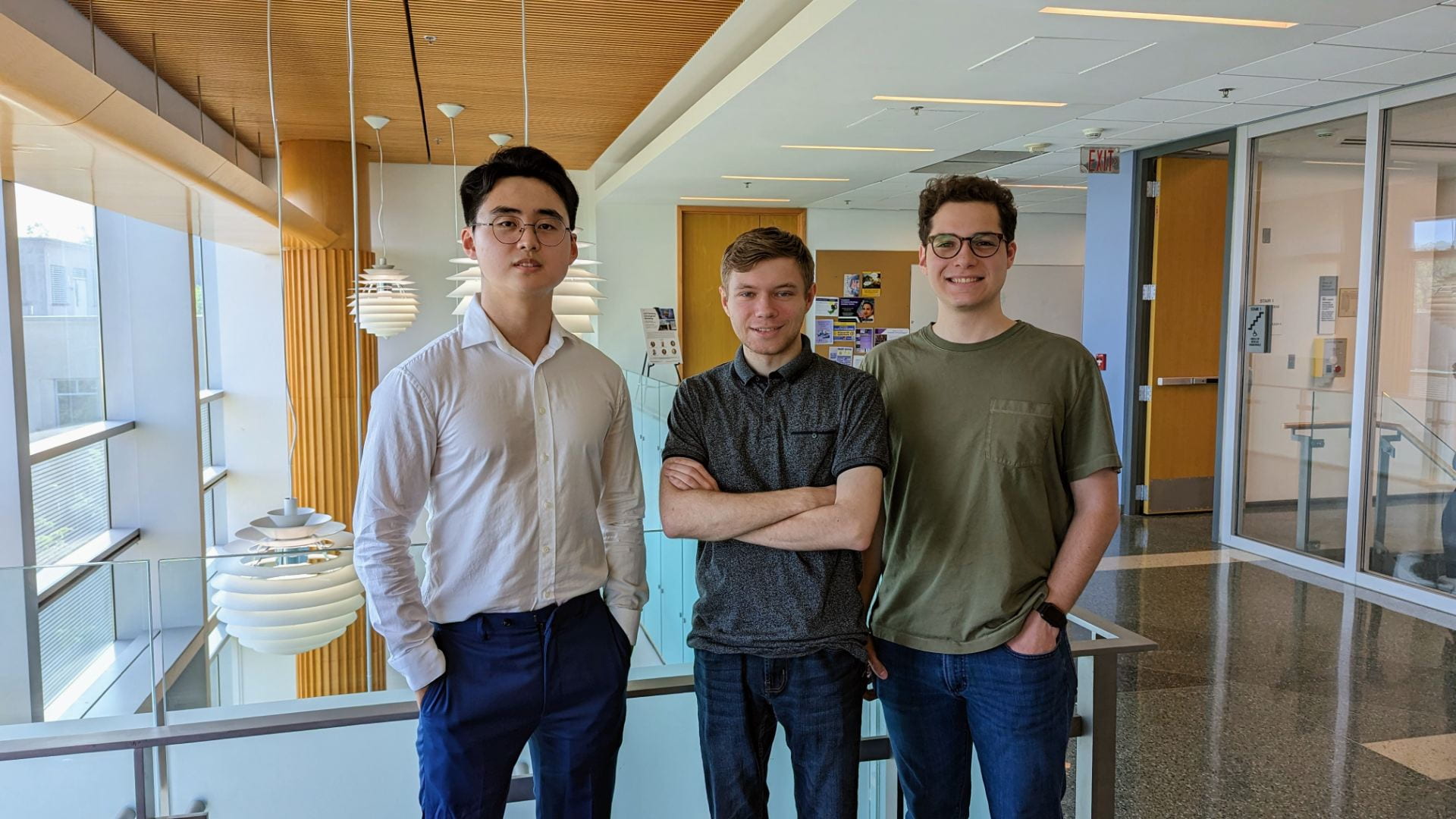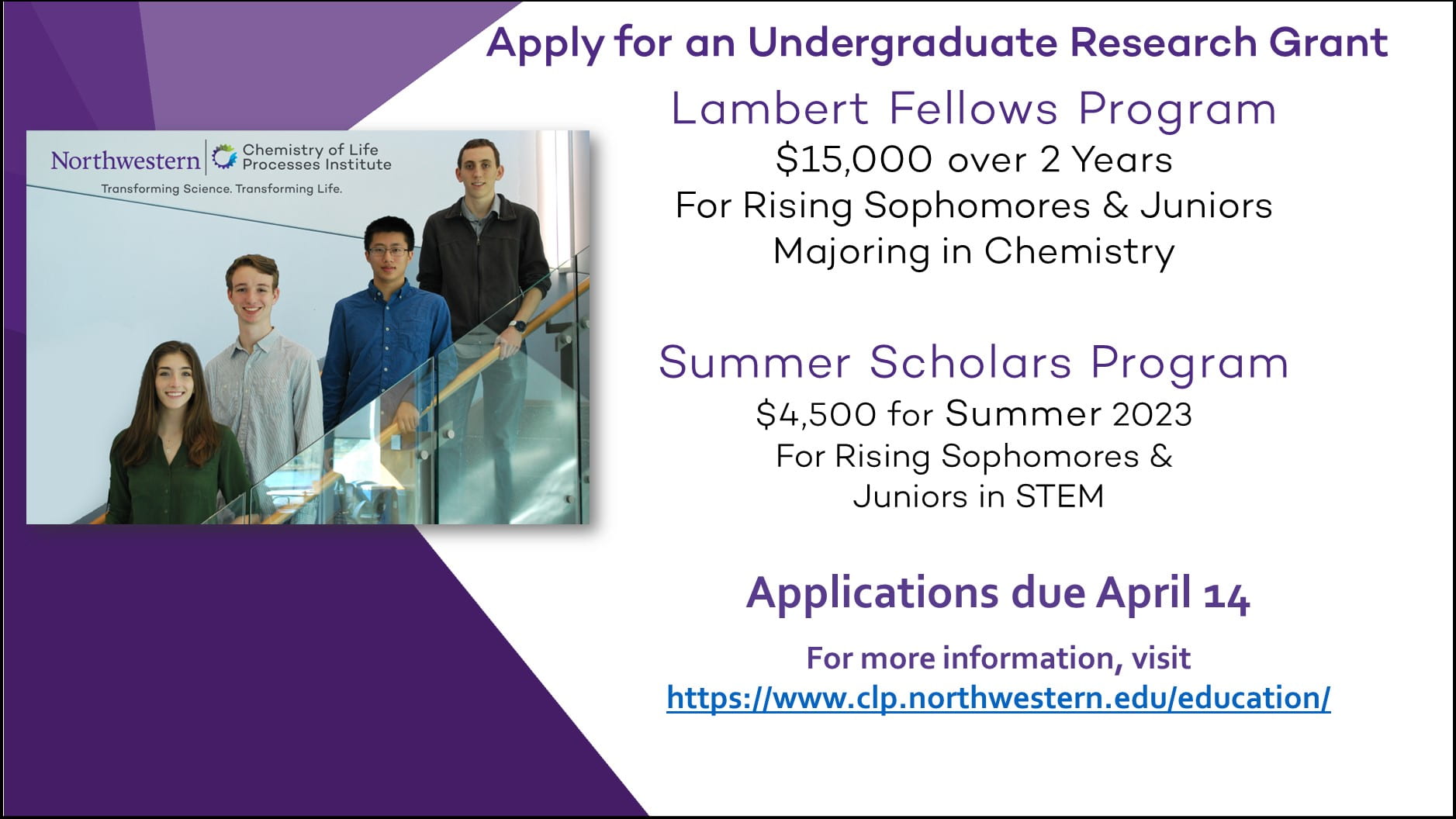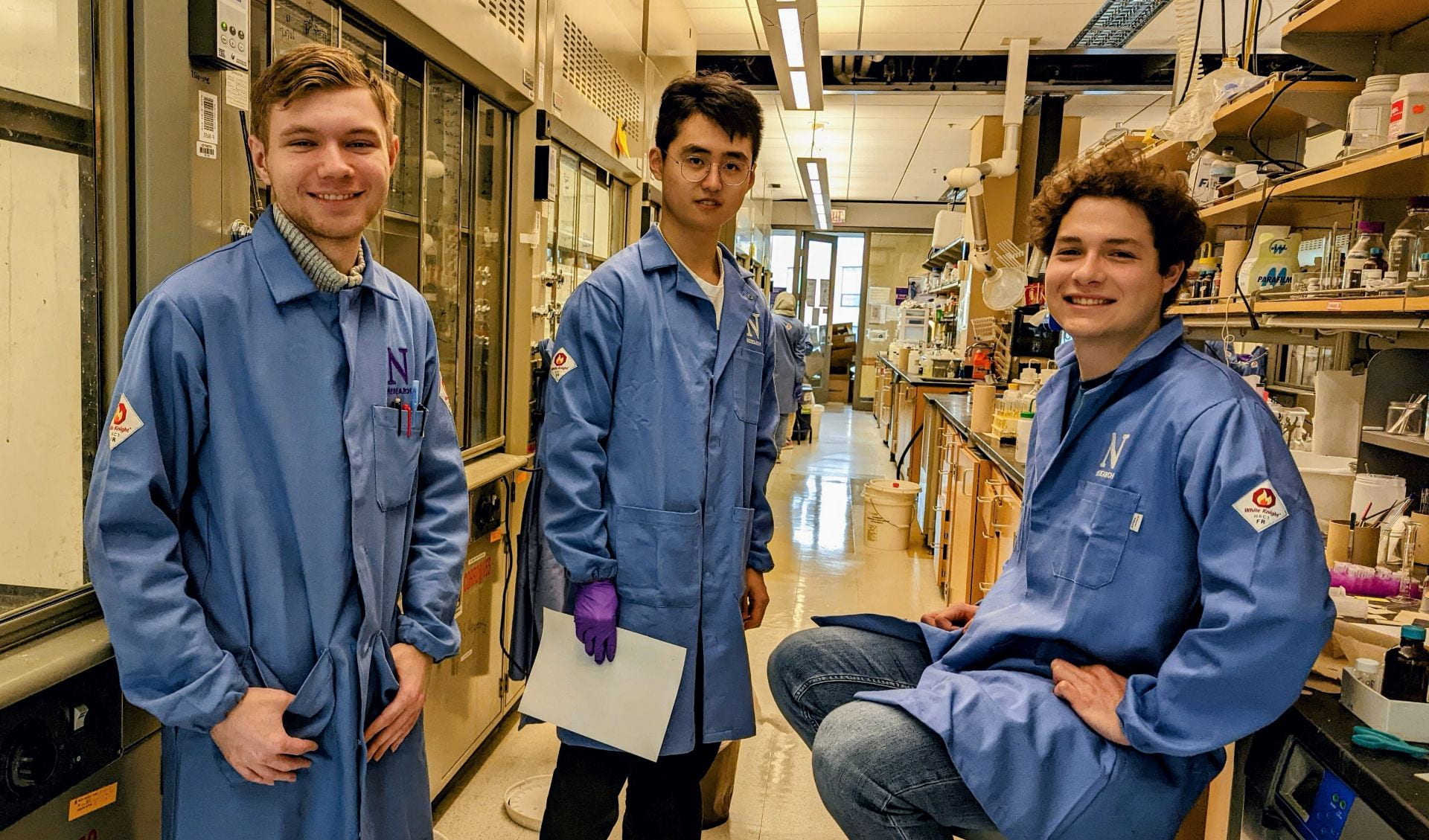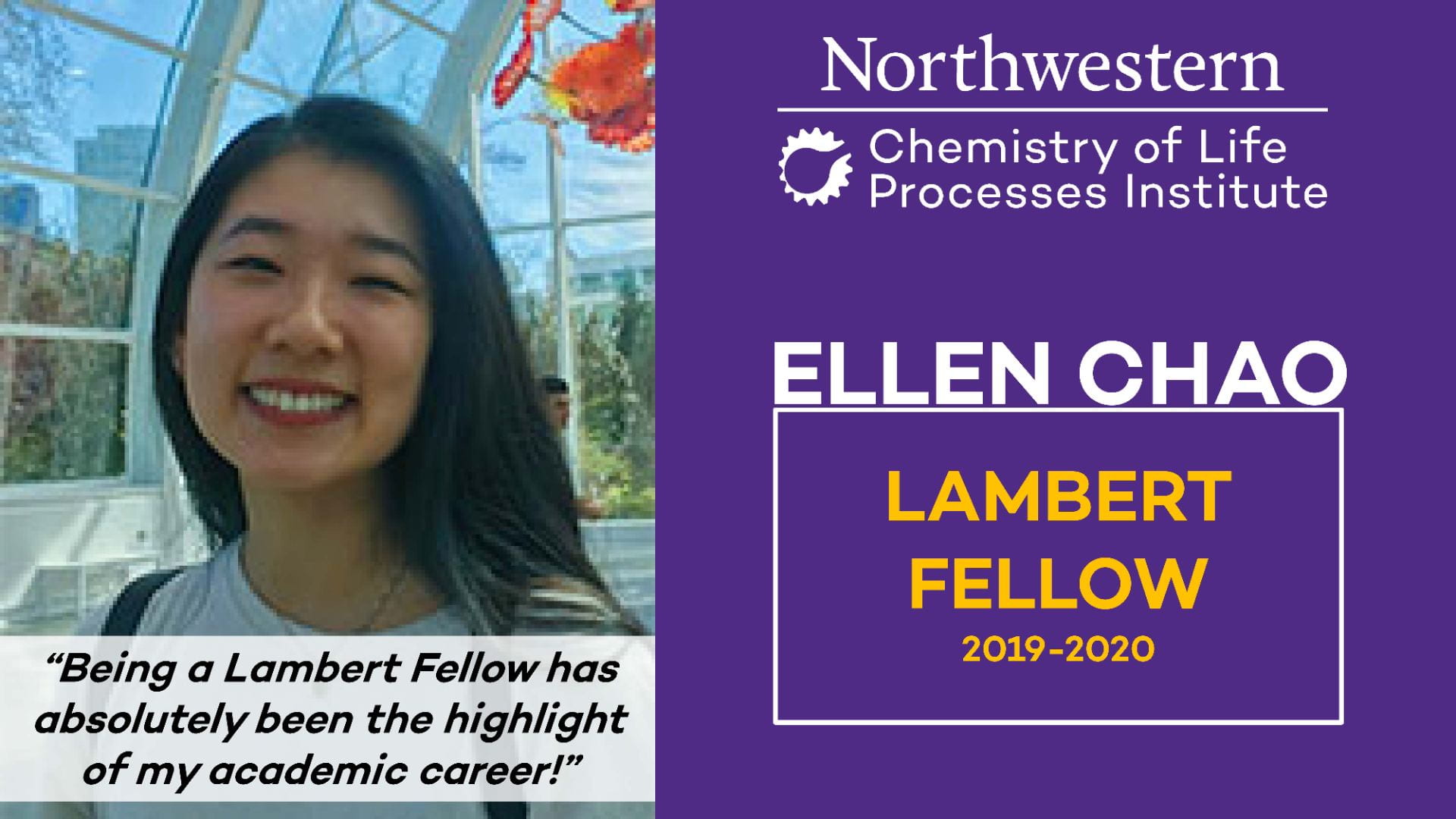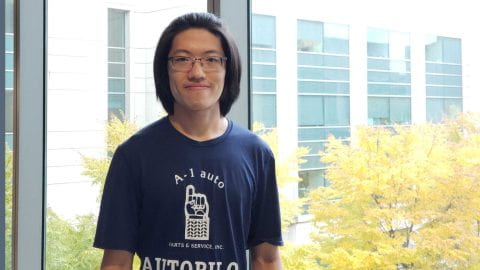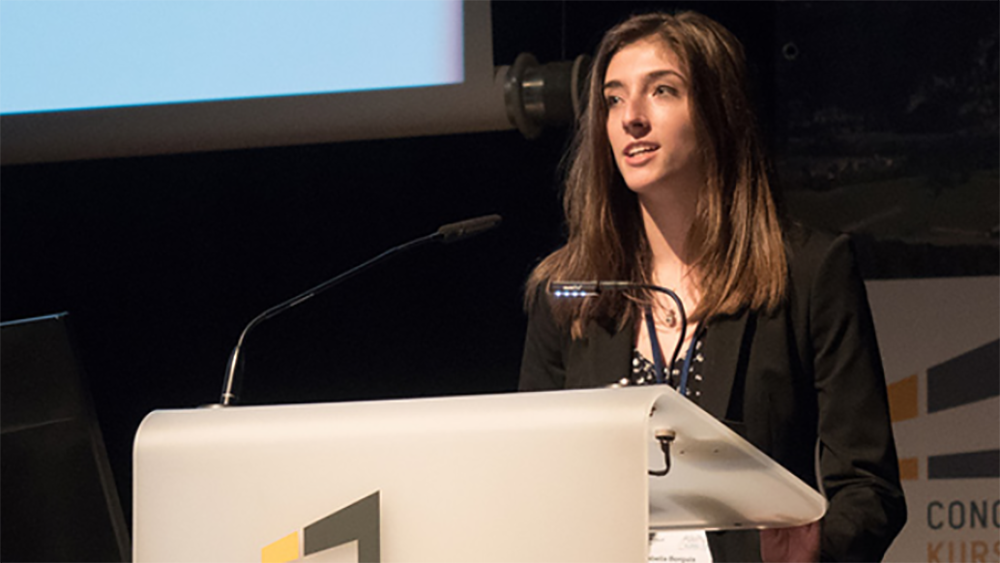The Lambert Fellowship
A Northwestern fellowship program for undergraduate chemistry majors.
Program dates: June 16, 2025 – August 20, 2027
Download the Application here.
Applications and letters of recommendation are due April 15 and should be emailed to Penelope Johnson at penelope.johnson@northwestern.edu.
PROGRAM DETAILs
The Lambert Fellowship is CLP’s most prestigious undergraduate award. It is designed to provide multi-year funding for hands-on lab research for rising sophomores and juniors majoring in Chemistry under the mentorship of CLP faculty members. The overall goal of the program is to create a cohort of enthusiastic, well-trained undergraduates who will be entrepreneurial in their approach to research. Fellowships will begin this summer and continue throughout the academic year for two years.
The program places students in a community of dedicated scholars, offering a generous stipend that covers research materials and supplies as well as travel and academic conference fees. It also includes a mentoring plan that allows Fellows to develop their skills with CLP faculty members, postdoctoral and graduate students who share the same interests.
The Lambert Fellowship was founded in 2010, and endowed in 2016, by CLP Executive Advisory Board Chairman and Senior Vice President of Research Biology at Genentech, Andrew Chan, MD, PhD (Weinberg). The program is named in honor of Dr. Joseph B. Lambert, the Clare Hamilton Hall Professor of Chemistry. Lambert was Dr. Chan’s advisor in the late 1970’s at Northwestern and helped him succeed as a student; Lambert had a profound impact on Chan’s educational experience.
For all questions, please contact Penelope Johnson at penelope.johnson@northwestern.edu.
ELIGIBILITY
Applicants must be Northwestern undergraduate Chemistry majors. Research must be conducted with a CLP faculty member. Previous lab experience is suggested. Applicants will be selected based upon their academic achievements and scientific interests. CLP funds two students each year.
HOW TO APPLY
Complete the application form. Click here to download the form.
Submit a one-page, single-sided proposal describing the research you would conduct if selected for this program. Include a title of your project centered at the top of the page, and your name. Use a standard 11 point font. A second page is allowed for figures and/or references.
Submit a letter of recommendation from a CLP faculty member with an appointment in Chemistry.
Applications and letters of recommendation should be emailed to Penelope Johnson at penelope.johnson@northwestern.edu.
HOW TO DEVELOP YOUR PROPOSAL
Those in a lab: Contact your PI at least three weeks in advance of the application due date and ask for his/her assistance with developing a proposal and for a letter of recommendation.
Most likely, your advisor can provide past examples of summer research proposals. Students must submit a one-page research proposal. You are being asked to describe your research project in your own words.
- What is the goal?
- How will you accomplish this goal?
- What methods will you use?
- What models (cell line, animals, etc.), if you are performing biological research?
Those who are looking to join a lab: Once you have an idea of whose lab you would like to join, reach out to the faculty member to set up a meeting. Plan on doing this at least four weeks before the application due date. Additionally, Northwestern’s Office for Undergraduate Research has a great website with resources on how to find a lab, develop a project, and work with faculty.
NU Office for Undergraduate Research General Information
NU Office for Undergraduate Research Proposal Writing
Projects include work in the following areas:
- Biochemistry
- Organic Synthesis
- Inorganic Synthesis
- Spectroscopy
- Polymer Chemistry
- Biochemistry
- Catalysis
- Theory
Projects can include use of the following facilities:
- Biological Imaging Facility
- Center for Advanced Molecular Imaging
- Developmental Therapeutics Core
- High Throughput Analysis Laboratory
- Proteomics Core
- Quantitative Bio-element Imaging Center
UNDERGRADUATE RESEARCH FORUM
The summer culminates in a research forum for all CLP undergraduates, including Lambert Fellows and Summer Scholars, with an audience of CLP faculty and members of their research groups. Students present a poster that features their summer research project.
Click here for more information on our workshops and activities.
STIPEND
Each Fellowship award amounts to $7,500 annually to be expended as follows:
- $4,500 stipend for summer living expenses
- $1,000 for travel to academic conferences
- $1,000 support for materials and supplies provided to the mentor’s lab for summer research
- $1,000 support for materials and supplies provided to the mentor’s lab for research during the academic year
Unused funds for travel and supplies revert back to CLP.
EXPECTATIONS
Summer Research Component: Lambert Fellows will engage in full-time research during the 10-week Summer Quarter for two years. Students must agree not to take on any other paid work or research grants for any part of the 10-week period and must not be enrolled in courses for any part of that period. Each scholar will work closely with a graduate student or postdoctoral mentor. Regular group meetings will give students opportunities to share their progress. Enrichment activities will include special lectures and a summer picnic. The funding for the summer research component of the Lambert Fellows program includes $1,000 annually for the mentor’s laboratory to cover project costs, and $4,500 stipend to the student to cover living expenses.
Academic Year Research Component: The Lambert Fellows Program will allow students to participate in research independent of the regular curriculum for three quarter-long projects. CLP will provide $1,000 to the mentor’s laboratory at the beginning of each year of the fellowship to cover research-related costs (e.g., lab supplies and instrument usage charges, etc.) for each Lambert Fellow. Lambert Fellows will work closely with a CLP faculty mentor to develop their proposed research projects and proposed budget allocations. Graduate student and postdoctoral mentors will also work closely with the students.
Conference/Travel Component: Each of the Lambert Fellows will be eligible for up to $1,000 annually for participation in scientific conferences and meetings. These travel funds will be administered by CLP and can cover conference registration and travel costs.
Lambert Fellows are required to:
- Present a poster at the completion of their project at CLP’s Undergraduate Research Forum held in August.
- Present a research poster or give an oral presentation at the Chicago Area Undergraduate Research Symposium held in April 2026.
Lambert Fellows are highly encouraged to actively participate in:
- CLP-sponsored workshops
- Institute-sponsored symposia
LAMBERT FELLOWSHIP WINNERS
| YEAR | NAME | NORTHWESTERN UNIVERSITY RESEARCH PROJECT |
| 2025-2027 | Nicholas Angulo | Improving A Metal Organic Framework for Industrial Catalysis |
| 2024-2026 | Tristan Weng | Enhancing Reepithelialization with Topographical Nano-Bio Interfaces |
| 2024-2026 | Ethan Brazelton | Structure Switching Molecular Pendulum for Reagentless Small Molecule Detection |
| 2024-2026 | Julian Novin | Synthesis and Evaluation of New Protein Aggregation Inhibitors for the Treatment of ALS |
| 2023-2025 | Monica Jones | New Methods for Deuteration of Bioactive Molecules |
| 2023-2024 | Dan Yang | Selective Inhibition/Degradation of MEK4 For the Treatment of PDAC |
| 2023-2024 | (Yung) Chi Li | Discovery and development of molecular glue degraders targeting androgen receptor splice variants-driven prostate cancer |
| 2022-2024 | JoJo Holm | A Protein Mimic Towards a Novel Therapeutic for Incurable Neurodegenerative Disease |
| 2022-2024 | Anthony Tam | Synthesis of α-Amino Ketones via Photoinduced Hydrogen Atom Transfer |
| 2021-2023 | Alejandro Medina | Synthesis of a new cyclopentene-based compound as a selective inactivator of ornithine aminotransferasev |
| 2021-2023 | Radoslaw "Rad" Chrzanowski | Optimization of Potent nNOS Inhibitor Blood-Brain Barrier Permeability |
| 2021-2023 | Suhao "Tiger" Wang | Treatment of epilepsy by the inhibition of GABA-AT |
| 2020-2022 | Charles (Charlie) Tiancheng Wang | Cooperative Photoredox and Organocatalysis for the Remote Alkylation of Unactivated Aliphatics |
| 2019-2021 | Ellen Chao | Determining the Toxicity of Natural Products on C. elegans |
| 2019-2020 | Emma Grace Schultz | Determining the Regulator Role of Zinc in Meiosis |
| 2018-2020 | Isabella Borgula | The Effect of Zinc Sparks on Murine Spermatozoa |
| 2018-2020 | Nathan Le Sage | Synthesis and Characterization of an Enantiomerically Pure GABA-AT Inactivator Research Proposal OR alternate title: Optically-Pure Synthesis of a GABA-AT and OAT Inhibitor |
| 2017-2019 | Terrence Stilson | Optimization of structural parameters of gold nanoparticle for siRNA delivery OR Selective DNA release from Gold Nanostars |
| 2017-2019 | Leighton Zhao | Benchmarking Anharmonic Computational Models for Raman Spectroscopy OR an alternate title: Assessment of Second-Order Vibrational Perturbation Theory on Small Aromatic Systems |
| 2016-2018 | Chi-Li Ni | Synthesis of GABA-AT inhibitors |
| 2016-2018 | Zer Keen Chia | Fluorinated Neurotransmitter Analogues at Potential 19F MRI Probes |
| 2016-2018 | Colin Lynch | Gd(III)-based molecular imaging of peroxynitrite |
| 2015-2017 | Morgan Carlton | Synthesizing an analogue of compound previously created by the Silverman group for the treatment of epilepsy |
| 2015-2017 | Kalli Koukounas | Synthesing a novel class of compounds from lignans, a family of naturally occuring chemical compounds isolate from plants, to treat malaria |
| 2014-2016 | Margaret Kelty | Application of Metal Organic Frameworks as Synthetic Red Blood Cells |
| 2014 Summer | Samuel Schneck | Enantioselective Hydroacylation of Carbonyl Compounds by Hydrogen Bond Donor and N-Heterocyclic Carbene Cooperative Catalysis |
| 2013-2015 | Anthony Pensa | My project, in collaboration with the Departments of Neurology at Harvard Medical School and Boston University, focuses on the development of small molecule therapeutic candidates for the treatment of Huntington’s disease. |
| 2013-2015 | Junjie (Anna) Shangguan | Developing new imaging probes to examine changes in zinc during mouse oocyte and embryo development. She is using zinc sensors previously developed in the O’Halloran as the starting point for the synthesis of fluorescent probes that can dissolve in water and thus be used to image zinc localization in live cells. |
| 2012-2014 | Ziyang Xu | The research intends to rationally design small molecular inhibitors of UbcH10 (an ubiquitin conjugating enzyme) to treat the ovarian cancer in humans. |
| 2011-2013 | Jonathan Leibowitz | Development and optimization of Zn2+ MRI activated contrast agents that will ideally be used to aid in the diagnosis of specific diseases such as Alzheimer’s. |
| 2011-2013 | Berkcan Akpinar | Synthesizing the proposed pharmacophore for maoecrystal V, a natural product exhibiting cytotoxicity against cervical cancer HeLa cells, in high yield for biological testing at the Northwestern University Feinberg School of Medicine |
| 2010-2012 | Jae-Hoon Chung | Synthesis of nano-sized fluorescent sensors for biological zinc to study its role on various biological processes in oocytes. |
| 2010-2012 | Hsiao-Tieh Hsu | Trinuclear ruthenium clusters to study the weak interactions of ligand-receptor binding by utilizing the Marcus Theory of Electron Transfer. |
| 2010-2012 | John Coukos | Working on the synthesis of an enzyme-activated contrast agent for use in developmental biology. |

